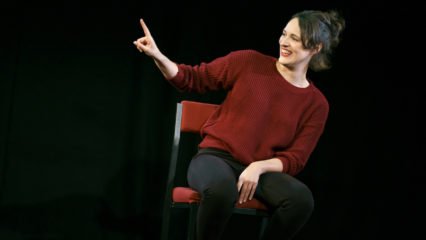As the coronavirus pandemic continues to sweep the world (and clear toilet roll and soap shelves at the supermarket), there has been continued discussion of the economic impact. We’ve already seen a major stock market drop in the just-past “Black Monday”, but there is another societal impact yet to be discussed: the arts. Caragh Medlicott explores what the future holds.
Mary Shelley projected a rather bleak end to our current century in her novel The Last Man. This apocalyptic story, like many before and since, imagined the demise of the human race via the unfortunately poignant twin disasters of a plague and – you guessed it – climate change. While artists have often preoccupied themselves with both supposedly looming and entirely fictionalised “end days” – there is little doubt that art itself requires a wealth of inspiration, facilitation and collaboration to thrive. After all, Shelley’s own Frankenstein found seed in the creepy group storytelling sessions of the summerless year of 1816 (gatherings which we might now call ‘creative writing workshops’).
The novel coronavirus pandemic is testing every aspect of global society, not least our governments and health care systems. With the COVID-19 virus sweeping the world (and loo roll aisles), the economic reverberations are already being felt. The stock market plummeted on Black Monday and continues to fall, interest rates have been cut and there is growing concern over sick pay, or more appropriately, lack of it. Event cancellations are falling like dominoes and any remnants of opportunity for public gatherings are sure to dwindle. In such a landscape there exists a pressing concern for the already struggling arts scene, both on a global scale and a local one.
Solitude may make up an essential part of the creative process, yet its fruition and refinement necessitate a move out of the one-person realm. Theatre, shows, exhibitions, gigs, readings, cinema; for better or worse, art is indivisibly linked with communal consumption. These end stages are not only how creators find monetary compensation, but are also essential in keeping funding moving through the system.
Wales was already in store for a trying 2020. Brexit signals likely cuts to a plethora of lifelines currently coming from EU funding streams. Wales is particularly dependent on trade with the EU in general, hence research indicating that four out of five creative businesses in Wales are concerned about the impact of Brexit. The further vicissitude of coronavirus elicits the postponement of films such as the James Corden-voiced Peter Rabbit 2 (although this example is arguably a win for culture as a whole). But for local arts organisations forced to cancel upcoming shows, these measures are far more serious; for them, regular outputs are not about profit margins but simply staying afloat.
Needless to say, the impact of the coronavirus is already squeezing artists and organisations across continents. From the Shanghai Symphony Orchestra’s cancellation of February and March concerts to an art exhibition preview cancelled in Bristol. The loss of ticketed events only stands to get worse. How will culture continue to thrive with dead spring, summer, and even autumn seasons stretching ahead? With so much uncertainty, the only option seems to be adapt or cut losses. Certainly, the arts scene will be forced to do both. An optimist might point out that creators are often in possession of agile, innovatively-inclined minds – and indeed, that optimism is what behind-the-scenes curators must grasp onto in such a moment.
A pandemic in the social media age is a rather bizarre thing. From the earliest moments of the outbreak, there have been Twitter pile-ons as the masses scramble to have the most current or superior opinion. Pandemics are good for Twitter fame, it would seem, yet for the elderly and immunocompromised such trivial pursuits are wistful. Still, there is surely a way to harness such concentrated global attention positively. After all, online communities can often be as vibrant and dedicated as physical ones. And that’s not to mention the geographical freedom of internet-based collaboration.
There are already some obvious alternatives for live events; big theatrical productions, such as Phoebe Waller-Bridge’s one-woman performance of Fleabag, have been broadcast directly to cinemas in previous months. It is not hard to see how this could be adapted for a variety of productions. In fact, Venice’s opera house, La Fenice, did just that when a string quartet live streamed their concert to an empty theatre after the coronavirus forced the cancellation of its upcoming performances.

Naturally, such alternatives require some compromise in the impact of delivery and overall experiential quality of the work. It is because of such unavoidable short fallings that friends to arts communities have such an integral role to play in the coming months. It will be empathetic understanding of workarounds, and continued support in the face of them, which bridges the gap between this pandemic and a period of stability. Small personal sacrifices – seeing the ticket for a cancelled event as a donation, rather than demanding a refund – make a big difference to organisations as a whole.
No one will be surprised by the claustrophobic, sign-of-the-times novels sure to be released in waves over the coming months and years. However, there may also be a surge in new artistic mediums. It is only tradition which imagines oeuvres must be restrained to the physical, “real world”. TeamLab Borderless have had huge success with their immersive tech-art exhibit in Tokyo – while this currently exists in the parameters of an actual museum, who knows how such work could explode in the virtual reality medium? Only time will show all the inventive and interesting ways art might find expression in a world where swathes of the population are living in self-isolation. It’s true that no amount of digital reworking can solve the dearth of public funding, but it may be able to provide some relief via crowdfunding in times of crisis.
Over the coming months it will be the gathering (or at least, online chat discussions) of cultural aficionados and time-generous ancillaries which will serve to soften the blows currently weathering arts communities. Whether you’re an eager audience member or active arts critic, sustained efforts, coverage and generosity will be needed in this time of stagnation. Amidst the panic and concern, it is crucial we remember that, even now, art is not a social luxury but a universal pillar of society – one which must continue both throughout and after the coronavirus pandemic. In choppy seas, it is art which reminds humanity there is, and always will be, cause for hope.
Caragh Medlicott is an Associate Editor at Wales Arts Review



 Enjoyed this article? Support our writers directly by buying them a coffee and clicking this link.
Enjoyed this article? Support our writers directly by buying them a coffee and clicking this link.







